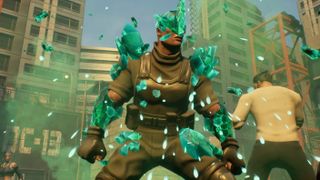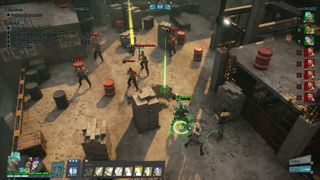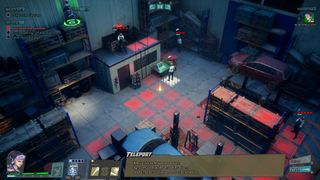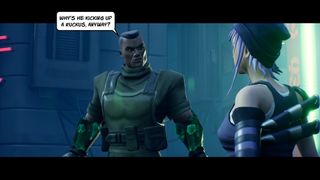Superheroes and XCOM collide in this brilliantly tense and tactical turn-based strategy game
Capes' unique characters, tricky teamwork, and punchy mission design make it a really exciting addition to the genre.

In the dystopian future of Capes, renegade superheroes are called "Capes", but none of them wear capes. What are you supposed to make of that? I was planning to dedicate the following 1000 words to trying to figure out a possible explanation for this bizarre state of affairs, but then it turned out to have really excellent turn-based strategy combat, so unfortunately I've had to pivot.
It's tempting to call this superhero XCOM, and certainly if you were disappointed by how Marvel's Midnight Suns strayed from the studio's roots this is likely to be more up your (crime-ridden) alley. Like that iconic series, the turn-based battles here are tense and methodical, and always a couple of wrong steps away from going horribly sideways. But really it's more akin to the forgotten XCOM spin-off Chimera Squad, with a roster of named operatives with unique skill sets and a focus on short, sharp mission design instead of managing a whole base and world map between fights.
Your team is a ragtag group of super-powered freedom fighters pushing back against the oppressive rule of "The Company" in their home of King City. Superheroes are outlawed, while supervillains secretly run the show from behind the scenes, keeping the populace in line with media propaganda. If you'll permit me one last XCOM comparison, it's oddly similar to the setting of XCOM 2, even down to its visuals, and indeed the sci-fi dystopia of it all does feel like it smothers attempts to make this feel like a comic book superhero story. Perhaps that's why there are no capes: they wouldn't be cool enough for this dark future.

It's all a decent enough excuse, however, for the existence of an endless supply of goons, henchmen, and sinister agents out to get you, and when you're in the streets cracking heads, oh boy does Capes feel super.
Each member of your team has a unique and really well-defined role that plays into their power set. Facet, for example, uses his ability to summon crystals to be the ultimate protector—his crystal armour lets him take a punch like no one else, he can block attacks on his allies with crystal shielding, and trap enemies in crystal growths. Meanwhile floating psychic Mindfire wants to bed-in at a safe position and act like a human artillery piece, amplifying damage against enemies and then bombarding them with telekinetic attacks.
The differences between each member feel really pronounced compared to other strategy games. When I say Facet's a tank and Mindfire's a bit squishy, it's a difference between the former being able to take gunshots to the head for round after round while the latter will struggle to survive a couple of punches. Equally, Facet will sometimes go an entire battle without doing any damage at all, while Mindfire's racking up the kills. Such extreme strengths and weaknesses fit the superhero genre nicely, but also create really interesting tactical puzzles.

Teamwork is key, and there are all sorts of clever mechanical elements to reward clever cooperation. For example, each character has their own set of "Team-Ups", which are essentially buffed versions of their abilities that they can use when they're close to specific other characters. Take the team's teleporter Rebound. She's always looking to get behind enemies for extra backstab damage and, if she's close enough to Mindfire, then when she uses her Strike ability, he can psychically compel the foe to turn around and expose their back for it. Every character has a Team-Up like this with every other character, not only opening up the ways they can work together, but also placing more importance on smart positioning of your units.
PC Gamer Newsletter
Sign up to get the best content of the week, and great gaming deals, as picked by the editors.
Extra texture comes in the ability to disarm opponents, knocking guns and melee weapons out of their hands or preventing supervillain opponents from launching powerful charged attacks. Again, each character has a unique way of doing it—Mindfire can do it from a distance with his telekinesis, while Rebound can teleport in close to combine a disarm with a healthy chunk of damage. Those different approaches mean that often the character most under threat from an armed assailant isn't the one best positioned to neutralise them, encouraging both further teamwork and thinking multiple turns ahead.
I do wish that tonally and visually the game had a more four-colour feel—I'm an old Freedom Force fan at heart, and King City is just a bit too bleak for my liking. But all of these well-judged twists and many more ensure that in battle you really do feel like you're commanding not just a squad but a superhero team.

If the game has a kryptonite, it's the story. There's quite a lot of cutscenes, and the character models that look just fine in battle really don't stand up to being zoomed-in on for long sections of dialogue. Uneven writing delivered via comic book speech bubbles doesn't help, especially in the game's more personal diversions—one side story focused on Rebound's complicated lesbian love life (possible she didn't get her name from her powers) has flashes of real humanity, regularly buried by horribly clunky lines. "What did I ever see in you?" she asks her ex-girlfriend during an argument. "You liked me for my brain… and my body" is the reply. Hmm.
But it does the job of propelling you from mission to mission and, when the action is this good, it's easy to forgive some dodgy connective tissue. For this preview I'm only able to play up until the end of the first act of the story—that's about four hours in—but already I feel like I've seen a really exciting slice of what Capes has to offer. The promise of unlocking more superheroes to experiment with and new enemies and bosses to throw them at… well, it's got me wishing my superpower was changing the date to May 29th! Because, er, that's when it's comes out.

Formerly the editor of PC Gamer magazine (and the dearly departed GamesMaster), Robin combines years of experience in games journalism with a lifelong love of PC gaming. First hypnotised by the light of the monitor as he muddled through Simon the Sorcerer on his uncle’s machine, he’s been a devotee ever since, devouring any RPG or strategy game to stumble into his path. Now he's channelling that devotion into filling this lovely website with features, news, reviews, and all of his hottest takes.
